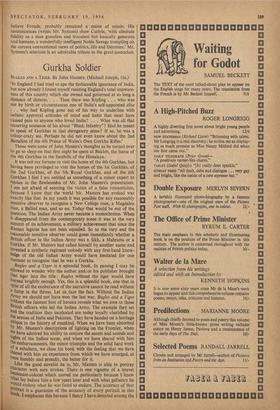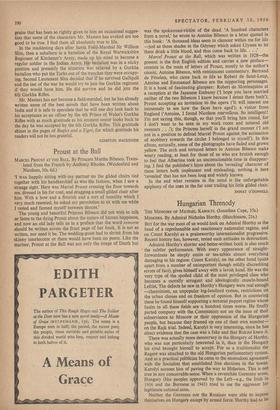Gurkha Soldier
BUGLES AND A TIGER. By John Masters. (Michael Joseph, 16s.) 'IN England I had tried to ape the fashionable ignorance of India, but now already I found myself resisting England's total unaware- ness of this country which she owned and governed at so long a distance of distaste. . . . Then there was Kipling . . . who was not by birth or circumstances one of India's self-appointed elite
• . . why had Kipling gone out of his way to underline with sadistic approval attitudes of mind and habit that must have caused pain to anyone who loved India? . . . What was all that recurring nonsense of his about "Black Infantry"? Had he meant to speak of Gurkhas in that derogatory sense? If so, he was a colour-crazy ass. Perhaps he did not even know about the 2nd Battalion of the 4th Prince of Wales's Own Gurkha Rifles.'
Those were some of John Masters's thoughts as he turned over 10 go to sleep on that first night he spent at Bakloh, the home of the 4th Gurkhas in the foothills of the Himalaya.
It was not my fortune to visit the home of the 4th Gurkhas, but having been privileged to visit the homes of the 1st Gurkhas, of the 2nd Gurkhas, of the 5th Royal Gurkhas, and of the 6th Gurkhas I feel I am entitled as something of a minor expert to rejoice in the flawlessness of Mr. John Masters's presentation. I am not afraid of seeming the victim of a false romanticism, because I know that the world Mr. Masters has evoked was exactly like that. In my youth it was possible for any reasonably sensitive observer to recognise a New College man, a Magdalen than, a Balliol man, and so on. Today that would he out of the question. The Indian Army never became a monochrome. When it disappeared from the contemporary scene it was at the very summit of its achievement, a military achievement that since the Roman legions has not been equalled. So to the very end the reasonably sensitive observer could guess immediately whether a British officer in the Indian Army was a Sikh, a Mahratta or a Gurkha. If Mr. Masters had called himself by another name and invented a synthetic regiment nobody with any first-hand know- ledge of the old Indian Army would have hesitated for one moment to recognise that he was a Gurkha.
Bugles and a Tiger is a splendid book. In passing I may be allowed to wonder why the author and/or his publisher brought that tiger into the title : Bugles without the tiger would have burned brightly enough. Yes, this is a splendid book, one that in spite of all the exuberance of the narrative cannot be read without a lump in the throat. Let us face the fact. Without the Indian Army we should not have won the last war. Bugles and a Tiger Without the faintest hint of heroics reveals what we owe to those British officers who led the Indian Army. The example they set and the tradition they inculcated are today loyally cherished by the armies of India and Pakistan. They have handed on a heritage unique in the history of mankind. When we have been absorbed by Mr. Masters's descriptions of fighting on the Frontier, when We have admired his ability to conjure the scents and sounds and sights of the Indian scene, and when we have shared with him the embarrassments, the minor triumphs and the solid hard work of a subaltern, we close his book with the feeling that we have shared with him an experience from which we have emerged, at ()nee humbly and proudly, the better for it. Like the good novelist he is, Mr. Masters is able to portray Character with sure strokes. There is one vignette of a brevet lieutenant-colonel which moved me particularly because I knew What lay before him.a few years later and with what gallantry he would endure what he was fated to endure. The accuracy of that Portrait is a guarantee of the accuracy of every portrait in this hook. I emphasise this because I fancy I have detected among the praise that has been so rightly given to him an occasional sugges- tion that some of the characters Mr. Masters has evoked are too good to be true. I find them all absolutely true to life.
In the maddening days after Suvla Field-Marshal Sir William Slim, then a subaltern in a battalion of the Royal Warwickshire Regiment of Kitchener's Army, made up his mind to become a regular soldier in the Indian Army. His battalion was in a sticky position and presently the situation was relieved by a Gurkha battalion who put the Turks out of the trenches they were occupy- ing. Second Lieutenant Slim decided that if he survived Gallipoli and the test of the war he would try to join the Gurkha regiment if they would have him. He did survive and he did join the 6th Gurkha Rifles.
Mr. Masters has not become a field-marshal, but he has already written some of the best novels that have been written about India and it is safe to speculate that he will one day look back to his acceptance as an officer by the 4th Prince of Wales's Gurkha Rifles with as much gratitude as his eminent senior looks back to the day he was accepted by the 6th Gurkha Rifles. This gratitude shines in the pages of Bugles and a Tiger, for which gratitude his readers will not be less grateful.
COMPTON MACKENZIE



































 Previous page
Previous page